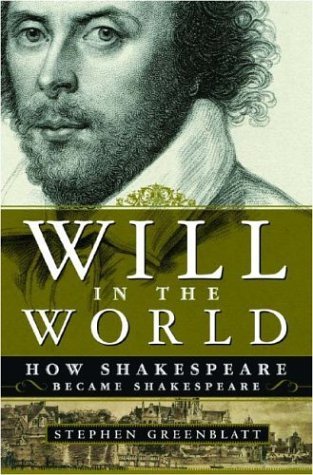Book Notes
 Stephen Greenblatt, Will in the World; How Shakespeare Became Shakespeare (New York: WW Norton, 2004), 430pp.
Stephen Greenblatt, Will in the World; How Shakespeare Became Shakespeare (New York: WW Norton, 2004), 430pp.
William Shakespeare (1564–1616) was the greatest playwright ever to grace the stage and page in the English language; he also remains the most elusive of biographical figures. Biographers who tackle the Bard undertake an exercise in conjecture, for even though by the seventeenth century England was a record-keeping society—the better to busy subsequent scholars—huge gaps remain in even the most basic reconstructions of Shakespeare's life. Greenblatt's subtitle, then, is a misnomer, for we really do not know how Shakespeare became Shakespeare, how a person from a provincial town, a modest family, and no wealth or personal connections, chose his vocation and "wrote the most important body of imaginative literature of the last thousand years" (p. 12).
The exact date of Shakespeare's birth (April 23 or 26?) is debated, and as for his death, we have no surviving account of the details of his last days, final illness and passing. All points in between, too, are matters of hypothesis and speculation. We think we know the name of his Stratford school teacher. The decade or more after he presumably finished school, and before he left Stratford for London, are known as the "lost years" because we know virtually nothing about this period of his life. Was he apprenticed to be a butcher? Did he follow in his father's footsteps as a glove maker? Perhaps he did a stint as a private tutor? Ambiguity qualifies all suggestions. We do know that at age eighteen (November 1582) he married Anne Hathaway, age twenty-six, and by the time he was twenty-one he had three children. Some time after that he left his wife and children and moved to London, although exactly how, when or why we do not know. Similar ignorance clouds our knowledge about his written work. We have, for example, only one manuscript autograph that was written by Shakespeare. Were his 154 sonnets written to a certain gay lover, or to a wider audience of men and women? "There is no way of achieving any certainty," writes Greenblatt, for "no one has been able to offer more than guesses, careful or wild." We have none of his personal letters, none of the books he surely owned, and nothing that is overtly self-revealing in his writings that otherwise revealed more about the complexities of human interiority than any other texts. After roughly twenty years in London, Shakespeare returned to Stratford and the family he had left behind, but even the date of this return is a matter of speculation.
How can we explain the breadth and depth of obscurity that hides even the basics of Shakespeare's life? It might simply be the result of historical accident and chance. Four hundred years is a long time. Perhaps more practical considerations, like avoiding trouble with political and ecclesial authorities, caused him to keep a low profile; to the former playwrights were subversive and to the latter immoral. Still, Greenblatt suggests that in Shakespeare's life and writings there is a deliberate "act of erasure" (p. 255) that prevents us from knowing him.
What Greenblatt does in his book is "to tread the shadowy paths that lead from the life Shakespeare lived into the literature he created" (p. 12). His views on anti-semitism, for example, emerge from consideration of his relationship with Christopher Marlow (who wrote The Jew of Malta) and his own play The Merchant of Venice. The death of his son Hamnet at age eleven and his father elucidate Hamlet and Shakespeare's genius at portraying human interiority and especially "tormented inwardness." King Lear connects with his return to Stratford from London's limelight and the last five years or so when he returned to Stratford and embraced the inevitability of old age, loss of power and identity, and family tensions. Greenblatt also shines in explaining the socio-cultural essentials of the day, such as the emergence of sixteenth century theater in London, the horrible violence that engulfed England as it alternated between Catholic and Protestant royalty, the literary nature of a sonnet to both hide and reveal, and so on. As the founder and leader of the New Historicist movement in literary studies, some have criticized Greenblatt for the notion that literature and art emerge mainly as a construct from society and less from a single individual's effort, the result being that readers learn more about Shakespeare's context than about the writer himself.
Greenblatt, professor of humanities at Harvard and one of the leading Shakespeare scholars today, has written an elegant book about a fascinating figure. Twenty or so color and black and white plates compliment the text.


